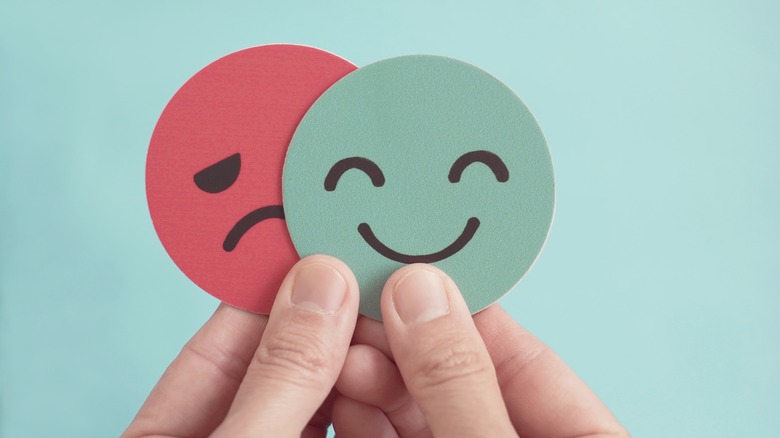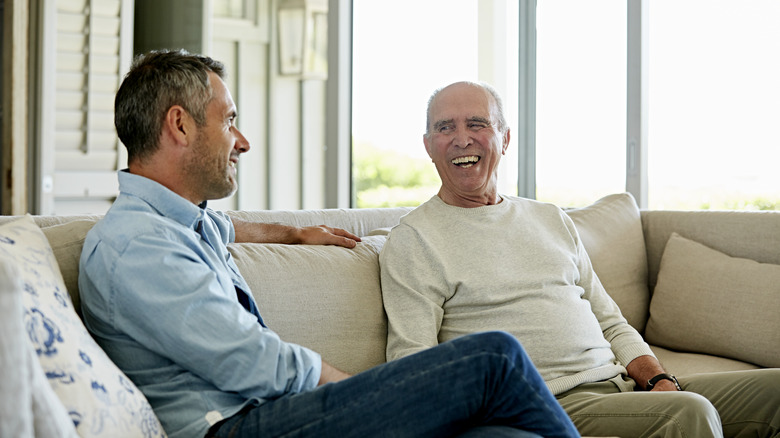How To Embrace Your Emotional Vulnerability & Be More Expressive With Your Feelings
When it comes to being emotionally vulnerable, it can be hard to express your feelings to the people who matter most in your life, and you may also question yourself with things like, "Why can't I say I love you?" From your romantic partner to your family and friends, being open and honest about your feelings can pave the way for healthier relationships. You may appear closed off to the people around you. You might struggle with how to deal with your own emotions, not just how to share them. Shutting others out of your life can end up feeling pretty lonely, but learning to open up has a way of allowing you to better connect with the people closest to you.
Being open about your feelings is an important part of building healthy relationships, and expressing how you feel is often necessary for setting boundaries and establishing needs. Psychologist Dr. Bernard Golden, founder of Anger Management Education, told Thriveworks "Many of us have grown up with the message that expressing our feelings makes us weak — when, in fact, it empowers us."
If you want to improve your relationships and communication skills, learning to be more vulnerable and express your feelings could help the people in your life understand you better. Not only that, but you learn more about yourself in the process. Here are some tips on being more open about your feelings.
Get in touch with your emotions
If you want to avoid being emotionally unavailable, it's important to get in touch with your emotions. Once you're able to better understand them, you'll begin to find it easier to know which ones to share and which ones to keep to yourself. As marriage and family therapist Rebecca Willams told PsychCentral, "Not all feelings need to be shared." By learning emotional intelligence, you can decipher which emotions should be dealt with on your own.
Developing emotional intelligence isn't impossible, but it takes a lot of work. To increase your EQ, as it's sometimes referred to, you need to be aware of your own feelings, capable of identifying the root causes, and then managing the emotions (and not just ignoring them). You also need to be aware of the emotions of those around you, and be able to discuss your emotions and others. Being aware of your own emotions is the best place to start. Learn where your emotions come from, and figure out what triggers your fears and anger. By naming your emotions — happy, scared, annoyed — you show your awareness of them. Finish off by expressing your emotions — write them down or talk to someone you trust.
Express your emotions through more than words
One of the best ways to be more expressive with your feelings is to learn to use body language, facial expressions, and anything more than just words. A hug can say so many things to a person, especially depending on when the hug is given — it shows them you care, that you feel empathy toward them, and perhaps even that you love them. In their book "The Definitive Book of Body Language," authors Barbara and Allen Pease wrote, "Most people are remarkably unaware of body-language signals and their impact, despite the fact that we now know that most of the messages in any face-to-face conversation are revealed through body signals" (per PsychCentral).
It helps to learn to read other people's body language and to understand your own. Your facial expression can say a thousand more things than your mouth is saying. And, while you don't want to rely on body language alone, it may help you express feelings that you find more difficult to talk about.
Practice mindfulness
Mindfulness is an easy practice to take up. It only requires we pay more attention to what we are thinking and feeling at any given moment. Being more aware of feelings helps us understand them better, and it helps us work to be more vulnerable. Rather than jumping from where you are to the solution, spend some time mindfully thinking of that path between — the feelings you have about it and what needs to be done, and sit with that for a bit.
Mindfulness meditation is another important ally when it comes to better understanding and learning to express emotions. Spend this meditative time slowing down and looking at your individual thoughts. The more you trust yourself and your emotions, the more you can open up about them. According to Dr. Elisha Goldstein, "When it comes to trusting ourselves, we need to have a retrievable memory of experiences where we are able to rely on ourselves to handle a difficult situation" (per Mindfulness Muse). This is where meditation comes in handy.
Be more self-compassionate
It's important that we don't judge ourselves too harshly — everyone makes mistakes, and it's all part of the learning process that is life. Being hard on ourselves sets us up to be mistreated by others; Anis Qizilbash notes, "How you treat yourself reflects how you let others treat you. If you're unkind to yourself, you create a standard for how much abuse you accept from others and as a result end up attracting abusive and disrespectful relationships" (via Psychology Today).
By forgiving ourselves for our failures and celebrating our victories, it helps us be able to be more open to others, whether we want to share something happy or sad with them. The compassion you feel for yourself helps you feel more for others. But that's not the most important thing: The fact that having more self-compassion has been linked with higher self-esteem, lower anxiety and stress, and a decreased fear of failure is even more significant. When you have compassion for yourself, you'll find it easier to speak up and talk about your emotions and work through your vulnerable spots. Always be kind — especially to yourself.
Talk about your emotions
For many folks, keeping their feelings to themselves has a feeling of strength that comes with it, mostly because some people are taught that expressing their emotions is a sign of weakness. That's absolutely untrue. The ability to properly express your emotions, and even work through them, is an important skill and shows how strong and in touch with yourself and others you truly are.
Start talking about your emotions. Find some safe people and share your feelings. Start small if you need to. The more you express these emotions and allow your vulnerability to be seen, the easier it will become. You'll go from asking yourself, "Why can't I say I love you," to freely expressing your feelings with the people near and dear to you. Thomas Edwards, Jr., founder of The Professional Wingman, told TZR, "Like any muscle, your ability to say it will get stronger, but it also requires you to build the emotional muscle of vulnerability, which can be challenging for some." The same goes for expressing any of your feelings and emotions — practice makes it easier to say what you need to say.





